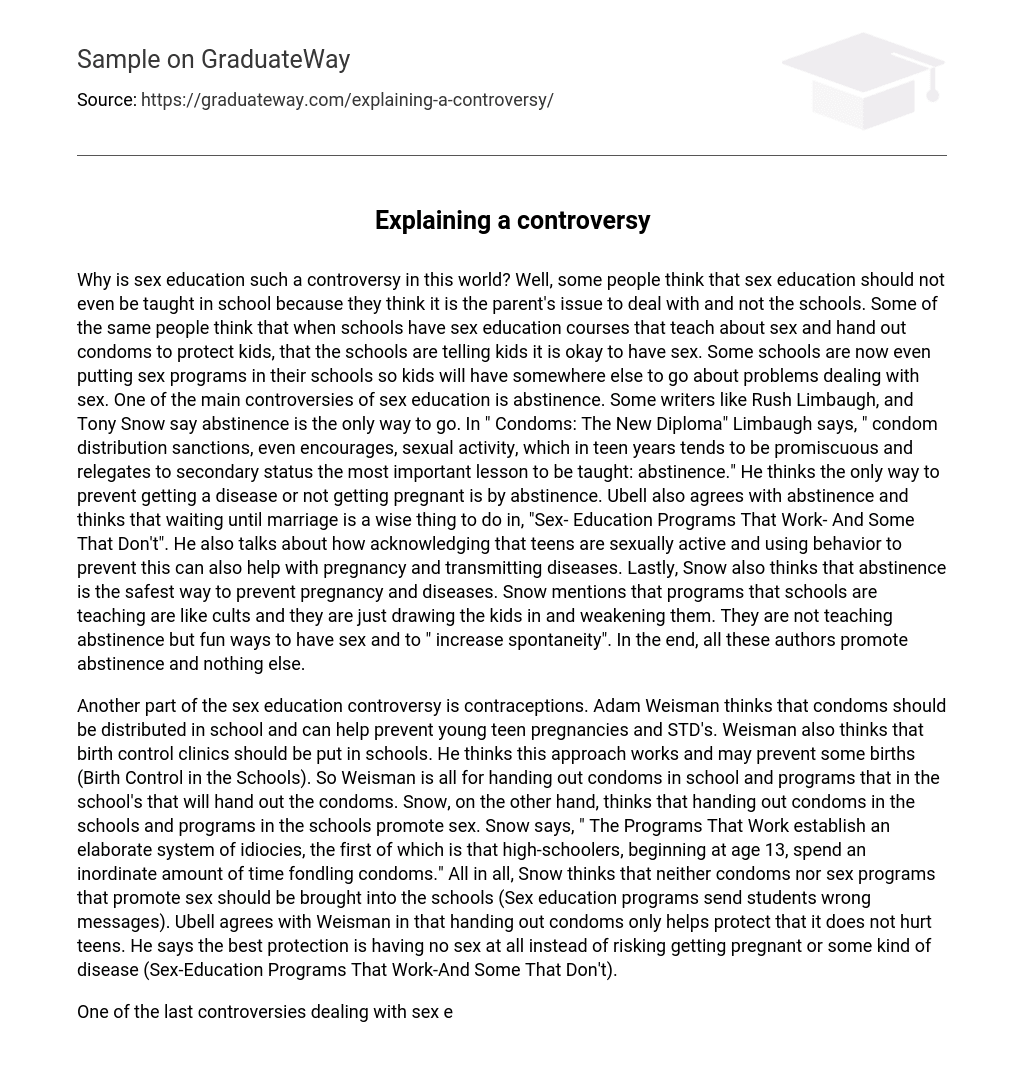Sex education is a controversial topic with differing opinions on whether it should be taught in schools or left to parents. Some believe that teaching sex education and providing condoms may imply acceptance of sexual activity, leading some schools to implement programs addressing related issues. The controversy often centers around abstinence as the only effective method, according to figures like Rush Limbaugh and Tony Snow. They argue that condom distribution encourages promiscuity, emphasizing the importance of teaching abstinence. Ubell also supports abstinence, stating that waiting until marriage is a wise decision. Additionally, promoting preventive behaviors can reduce both pregnancy and disease transmission among teenagers, as Ubell suggests. Snow shares the belief that abstinence is the safest approach to preventing pregnancy and diseases, criticizing school programs for resembling cults and enticing vulnerable children with exciting methods rather than emphasizing abstinence. Ultimately, these program authors exclusively advocate for abstaining from sexual encounters.
There is a debate surrounding sex education, particularly in relation to contraceptives. Adam Weisman supports the distribution of condoms in schools as he believes it can reduce teenage pregnancies and prevent the spread of STDs. Additionally, Weisman advocates for the establishment of birth control clinics within schools, seeing this approach as effective in preventing pregnancies (Birth Control in the Schools). Snow, on the other hand, argues that distributing condoms and promoting sex through school programs actually encourage sexual activity. He believes these programs contain nonsensical elements and mistakenly focus on teenagers spending excessive time handling condoms from the age of 13 (Sex education programs send students wrong messages). In contrast to Snow’s viewpoint, Ubell concurs with Weisman’s perspective that providing condoms protects rather than harms teenagers. She asserts that abstaining from sex altogether is the best form of protection, eliminating the risk of pregnancy or contracting diseases (Sex-Education Programs That Work-And Some That Don’t).
The decline in communication about sex between kids and their parents has become a recent issue in sex education. Weisman argues in “Birth Control in the Schools” that this lack of conversation contributes to teen pregnancies. Limbaugh suggests in his article that parents should be honest with their children about sex and educate them on how to prevent AIDS and other dangers. Ubell also supports the idea of discussing sex with parents, advocating for school programs addressing the pressures of sex. Prior to implementing these programs, a letter was sent to parents informing them of the approaches being taken, facilitating discussions between parents and students about the topic (Sex-Education Programs That work-And Some That Don’t).
My belief is that it would be advantageous to introduce sex education programs in schools and distribute condoms. Personally, I feel uncomfortable discussing sexual matters with my parents and prefer seeking guidance from someone else. I am confident that there are other young individuals who share this sentiment and believe their only option is to seek help from a program or the health department. Therefore, I advocate for implementing sex education programs in schools while also providing condoms. Additionally, we must consider teenagers who are too embarrassed to buy condoms at a store. The mere thought of entering a store overwhelms them, leading them to go without protection and potentially face long-lasting consequences on their lives.
All these authors agree that abstinence is the sole method of preventing sex and that schools should exclude condom distribution and sex programs. Abstinence is not only the safest but also the preferred approach to teach teenagers. Sex education is currently a highly debated topic, even surpassing drug debates, and will continue to improve until there is proper regulation of teenage sexual activity.





